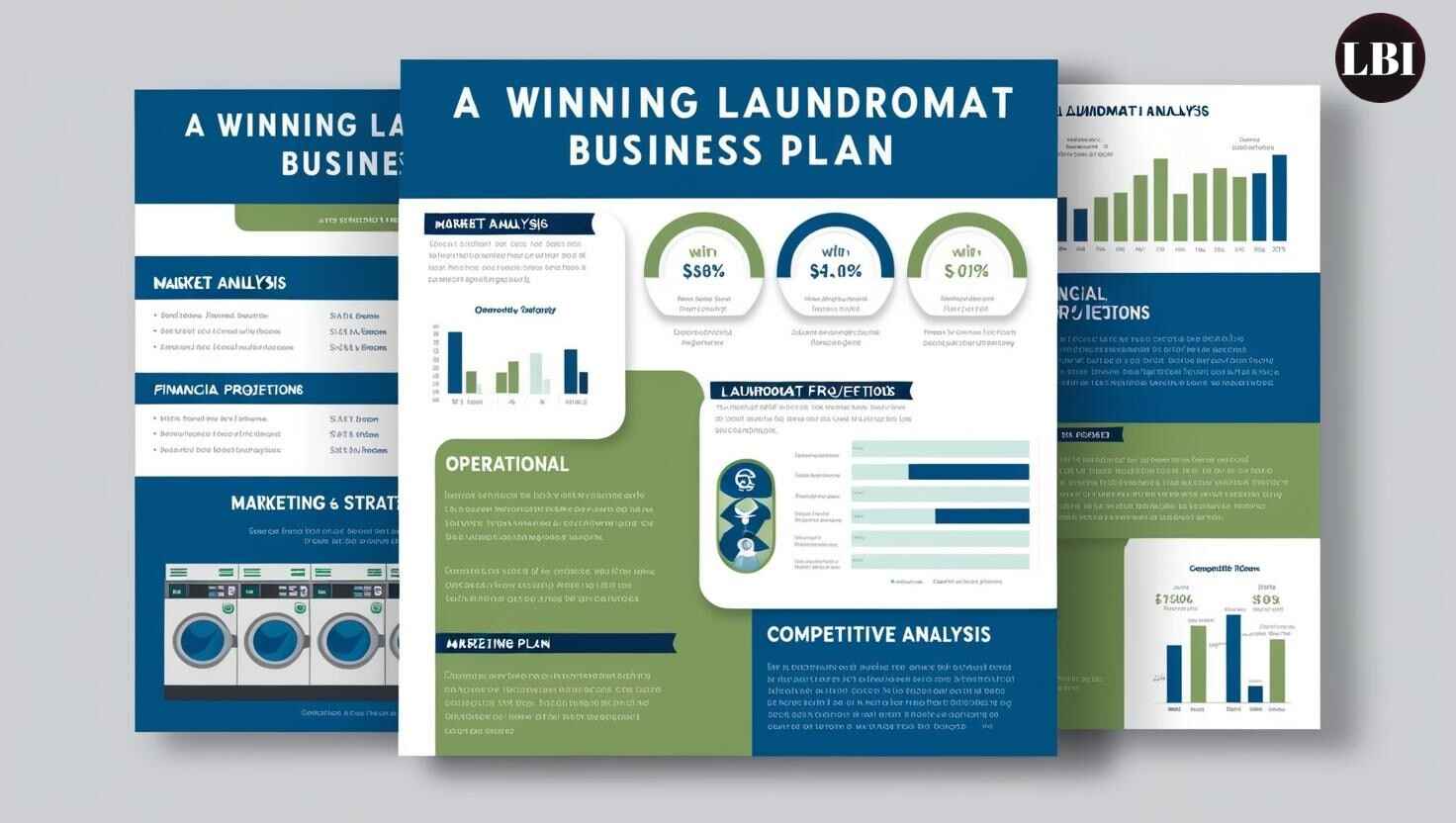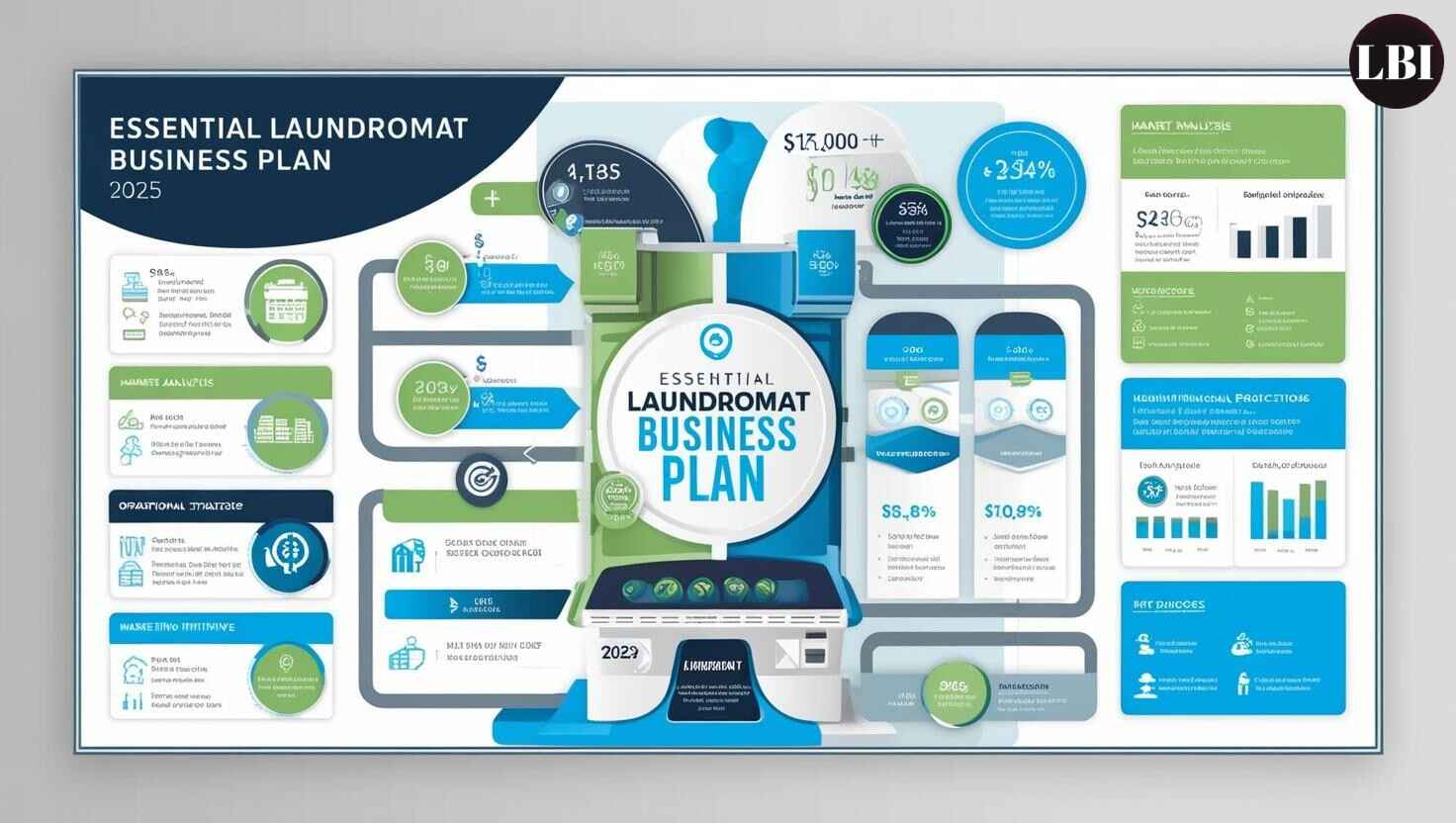If you plan to venture into a laundromat business in 2025, you’re in the right spot. Laundromats are steady and profitable, especially when individuals need simple laundry amenities. But success is never a matter of chance; you require a good and sound Laundromat Business Plan.
Whether starting from scratch or expanding a current laundry business, this article will provide all the information you’ll need to create a cutting-edge, practical business plan. Let’s simplify it in plain English.
Why You Need a Laundromat Business Plan
Consider your laundromat business plan like a GPS. It informs you of where you’re headed and how to arrive. Although it’s a requirement if you’re looking for funding or investors, it’s just as helpful in staying tidy, being realistic about what you can accomplish, and sidestepping expensive errors.
Without a plan, you may forget to account for costs such as machine maintenance, customer demand, or pricing strategy. When things go wrong (and they will), your plan is a guide to get back on track.
Key Parts of a Successful Laundromat Business Plan
Key Sections of a Winning Laundromat Business Plan
 1. Executive Summary
1. Executive Summary
This is your elevator pitch: short, sharp, and impactful. Even though it comes first, write it last. Include:
- What your laundromat does
- Your target market (e.g., college students, busy professionals, families)
- Unique selling points (e.g., 24/7 service, eco-friendly machines, pickup and delivery)
- Basic financial projections (e.g., break-even in 18 months)
Make it easy for investors or partners to say “yes.”
2. Company Description
Dive into the heart of your business:
- Business structure (sole proprietorship, LLC, partnership)
- Business location and why you chose it (visibility, foot traffic, proximity to residential areas)
- Whether you’re launching a new venture or growing an existing one
- Services offered: self-service, wash-and-fold, dry cleaning, vending, detergent sales, etc.
- Any special touches like free Wi-Fi, kids’ play area, or sustainable operations
Let your passion show. Why does your Laundromat Business Plan matter to the community?
3. Market Research
 Understand your environment:
Understand your environment:
- Who are your customers?
- What is the local demand for laundry services?
- Who are your competitors, and how can you add more value?
- What are the average prices in the community?
This section should reflect thorough research, surveys, local demographic data, and competitor analysis.
4. Services and Products
List everything you plan to offer:
- Self-service washers and dryers
- Wash-and-fold service
- Dry cleaning drop-off
- Pickup and delivery options
- Additional items: vending machines, detergent sales, garment bags
Describe what makes your Laundromat Business Plan convenient and comfortable for your target customers.
5. Operations Plan
The nuts and bolts of your daily operations:
- Size and layout of your facility
- Number and type of machines
- Staffing plans (full-time, part-time, or owner-operated)
- Hours of operation (consider 24/7 for higher accessibility)
- Equipment vendors and supply chain
- Maintenance and repair strategies
Operational efficiency builds customer trust and loyalty.
6. Marketing Plan
People need to know you exist and why they should choose you. Include:
- Brand identity: logo, name, color scheme, tone of voice
- Digital presence: website, social media, online booking
- Google Business Profile & local SEO
- Promotions: first-time user discounts, referral bonuses, loyalty cards
- Local engagement: sponsorships, events, flyers, partnerships
Your goal: make your Laundromat Business Plan the neighborhood favorite.
7. Financial Plan
 Numbers speak louder than words, especially to lenders and investors. Your plan should include:
Numbers speak louder than words, especially to lenders and investors. Your plan should include:
- Startup costs: machines, lease, renovations, licenses, signage
- Monthly operating expenses: utilities, payroll, rent, marketing, repairs
- Revenue projections: expected daily/weekly customer volume
- Break-even analysis: How long will it take to turn a profit
- Cash flow forecast and contingency plan
Be realistic. Use conservative estimates and back them with data.
8. Conclusion
Sum up your vision and your confidence in its success. Reiterate:
- What sets your laundromat apart
- Why will it thrive in the current market
- Your commitment to service, quality, and growth
Keep it concise but inspiring.
Final Thoughts
A strong Laundromat Business Plan can mean the difference between success and struggle. It’s your blueprint for building a modern, profitable business that serves real needs in your community.
In 2025, customers want more than equipment; they need convenience, cleanliness, and technology. Features such as cashless payment systems, real-time machine availability monitoring, and green-friendly options will set you apart.
With thoughtful planning, wise investments, and a customer-first mindset, your Laundromat Business Plan can become a beloved local brand and a stable income source for years.
Frequently Asked Questions (FAQs)
1. How much does starting a laundromat Business in 2025 cost?
Startup costs can vary depending on location, equipment, and size. Expenses include leasing space, buying machines, renovating, and licensing.
2. Are laundromats profitable in 2025?
Laundromats remain highly profitable due to consistent demand and low labor requirements. Many see ROI within 2–3 years.
3. Do I need experience to start a laundromat?
Experience is unnecessary, but a good business plan, customer service knowledge, and general mechanical aptitude will benefit.
4. How do I choose the best location for my laundromat?
Look for areas with:
- High rental populations
- Limited nearby competitors
- Good foot or vehicle traffic
- Access to parking or public transport
5. What licenses or permits do I need?
You’ll typically need:
- Business license
- Sales tax permit
- Water and sewer permits
- Fire and safety inspection approval
Check with your local municipality for exact requirements.
6. Is new or second-hand equipment right for me?
New machines come with warranties and use less water and electricity. Used machines are economical but can require more maintenance. Choose depending upon your budget and longer-term aspirations.
7. How can I stand out from other laundromats?
Offer:
- Modern conveniences (app-based payments, machine availability trackers)
- Exceptional cleanliness
- Great customer service
- Unique amenities like lounge areas, Wi-Fi, or refreshments






